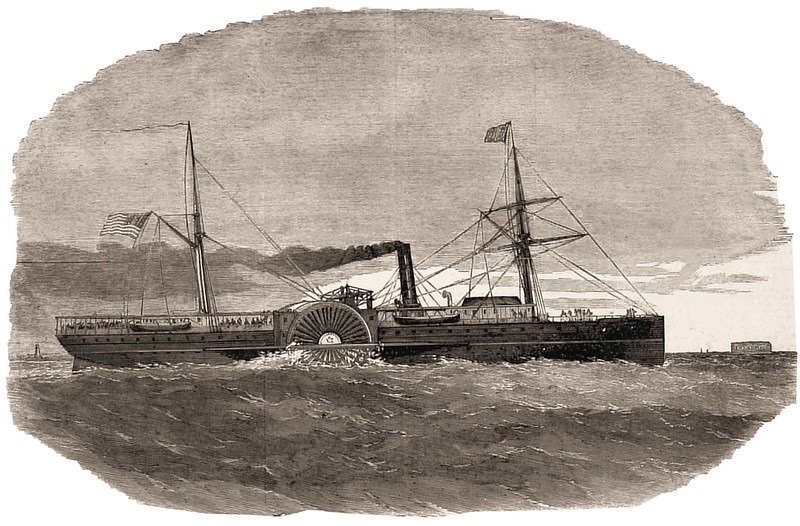Harper’s Weekly, January 19, 1861

The Steamship ‘Star of the West’
WE publish herewith pictures of the United States steam-sloop Brooklyn, and of the steamship Star of the West, and of the steamship Marion, which three vessels figured so prominently in the movements of last week; and on page 37 we give a large plan of Charleston harbor, showing the forts, etc., together with a view of Fort Johnson. These pictures will enable our readers to realize what is going on in this most memorable contest of the present age.
On Wednesday morning, January 9, 1861, the first shots were fired. At daybreak on that morning the steamship Star of the West, with 250 United States troops on board, attempted to enter the harbor of Charleston for the purpose of communicating with Fort Sumter. The people of Charleston had been warned of her coming and of her errand by telegraph. They determined to prevent her reaching Fort Sumter. Accordingly, as soon as she came within range, batteries on Morris Island and at Fort Moultrie opened on her. The first shot was fired across her bows; whereupon she increased her speed, and hoisted the stars and stripes. Other shots were then fired in rapid succession from Morris Island, two or more of which hulled the steamer, and compelled her to put about and go to sea. The accompanying picture shows the Star of the West as she entered Charleston harbor; the plan will explain the situation of the forts, and the position of the steamer when she was fired upon. The channel through which she passed runs close by Morris Island for some distance.
Fort Sumter made no demonstration, except at the port-holes, where guns were run out bearing on Morris Island.
About eleven o’clock A.M. on 9th a boat from Fort Sumter, bearing Lieutenant Hall with a white flag, approached the city. Lieutenant Hall had an interview with Governor Pickens, and was afterward escorted to his boat and re-embarked for Fort Sumter. The communication from Major Anderson was as follows :
Major Anderson to Governor Pickens
“To His Excellency the Governor of South Carolina:
“SIR,—Two of your batteries fired this morning on an unarmed vessel bearing the flag of my government. As I have not been notified that war has been declared by South Carolina against the United States, I can not but think this a hostile act, committed without your sanction or authority. Under that hope I refrain from opening fire on your batteries. I have the honor, therefore, respectfully to ask whether the above-mentioned act—one which I believe without parallel in the history of our country or any other civilized government—was committed in obedience to your instructions, and notify you, if it is not disclaimed, that I regard it as an act of war, and I shall not, after reasonable time for the return of my messenger, permit any vessel to pass within the range of the guns of my fort.
“In order to save, as far as it is in my power, the shedding of blood, I beg you will take due notification of my decision for the good of all concerned. Hoping, however, your answer may justify a further continuance of forbearance on my part, I remain, respectfully,
“Robert Anderson”
Governor Pickens Response to Major Anderson
“Governor Pickens, after stating the position of South Carolina to the United States, says that any attempt to send United States troops into Charleston harbor to reinforce the fort would be regarded as an act of hostility, and in conclusion adds that any attempt to reinforce the troops at Fort Sumter, or to retake and resume possession of the forts within the waters of South Carolina, which Major Anderson abandoned after spiking the cannon and doing other damages, can not be regarded by the authorities of the State as indicative of any other purpose than the coercion of the State by the armed force of the Government.
“Special agents, therefore, have been off the bar to warn approaching vessels, armed and unarmed, having troops to reinforce Fort Sumter aboard, not to enter the harbor. Special orders have been given the commanders at the forts not to fire on such vessels until a shot across their bows should warn them of the prohibition of the State. Under these circumstances the Star of the West, it is understood, this morning attempted to enter the harbor with troops, after having been notified she could not enter, and consequently she was fired into. The act is perfectly justified by me.
“In regard to your threat about vessels in the harbor, it is only necessary for me to say you must be the judge of your responsibility. Your position in the harbor has been tolerated by the authorities of the State, and while the act of which you complain is in perfect consistency with the rights and duties of the State, it is not perceived how far the conduct you propose to adopt can find a parallel in the history of any country, or be reconciled with any other purpose than that of your government imposing on the State the condition of a conquered province.
“F. W. Pickens”
To His Excellency Governor Pickens:
” SIR,—I have the honor to acknowledge the receipt of your communication, and say that, under the circumstances, I have deemed it proper to refer the whole matter to my Government, and intend deferring the course I indicated in my note this morning until the arrival from Washington of such instructions as I may receive.
“I have the honor also to express the hope that no obstructions will be placed in the way, and that you will do me the favor of giving every facility for the departure and return of the bearer, Lieutenant T. Talbot, who is directed to make the journey.
“Robert Anderson”
Lieut. Talbot left Charleston accordingly for Washington, without hindrance by the authorities.